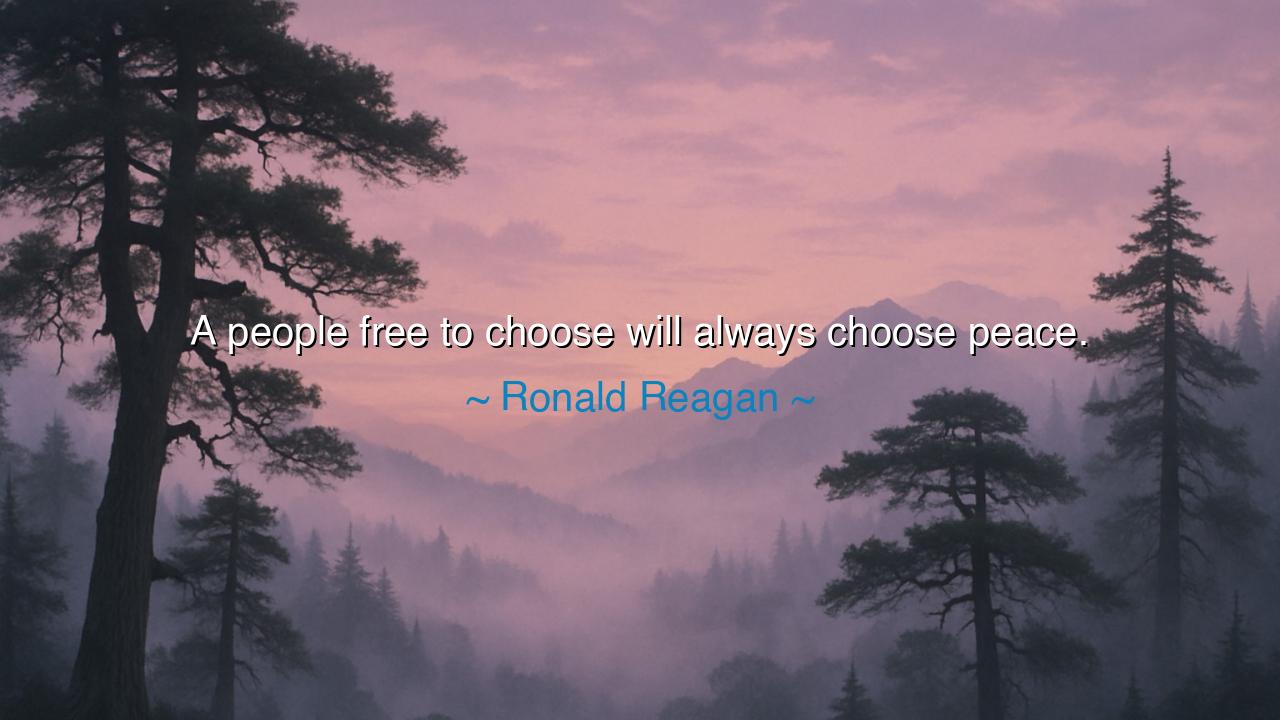
A people free to choose will always choose peace.






Ronald Reagan, the voice of an age that trembled under the shadow of nuclear fire, once declared: “A people free to choose will always choose peace.” These words are not the idle musings of a statesman, but the distilled wisdom of one who had witnessed both the ravages of war and the blessings of liberty. In this phrase lies a profound truth: that the natural desire of humanity is not conquest, not bloodshed, but tranquillity—so long as men and women are free to pursue it without the chains of tyranny or the manipulations of rulers who hunger for power.
The origin of this saying lies in the crucible of the Cold War. Reagan spoke as one who sought not only to defend freedom but to remind the world of its purpose. The nuclear standoff between East and West was not born from the desires of ordinary people, but from the ambitions of regimes that wielded their citizens like weapons. Reagan understood that when men are enslaved by propaganda, or when they are stripped of their voice, war becomes the language of the state. But when men are free—when they are allowed to follow their hearts and hopes—they will not choose destruction, but the peace that allows their children to flourish.
This truth is echoed throughout history. Consider the long centuries of monarchs who dragged nations into war for dynastic pride, while peasants and commoners yearned only for their fields, their families, and their bread. Rarely did the people themselves clamor for conflict; it was the crown, not the village, that stoked the fires of battle. Likewise, in modern times, the wars of dictators—from Hitler to Saddam—were not born from the will of the people, but from rulers who robbed them of choice. Reagan’s words thus ring as both an observation and a challenge: give the people liberty, and they will show the world their natural inclination toward peace.
History gives us a shining example in the aftermath of World War II. Germany and Japan, once nations led into devastation by totalitarian power, were rebuilt upon the foundations of democracy and freedom. And what was the fruit of this transformation? These nations, once fierce aggressors, became among the strongest advocates of peace and international cooperation. This miracle of history proved Reagan’s conviction: when people are free to shape their destiny, they will not choose the sword—they will choose the plowshare.
Yet there is also a warning within his words. For if freedom is lost, so too is the natural bond with peace. Tyranny thrives on fear, and fear is the soil in which war grows. Thus, the fight for liberty is inseparable from the fight for peace. To protect freedom is not merely to defend rights—it is to guard the very possibility of a world without endless bloodshed. Peace and liberty are twins; where one dies, the other cannot long endure.
The lesson for us is clear: if we wish to see peace flourish, we must labor to preserve freedom wherever it is threatened. This begins in our homes and communities—respecting the rights of others, seeking justice over domination, and fostering dialogue instead of discord. It continues in the halls of nations, where the defense of human liberty must be seen not only as an ideal, but as the surest path to enduring peace.
Practically, we must cultivate the habits of freedom in daily life. Defend the right of others to speak, even when you disagree. Choose cooperation over coercion. Teach the young that liberty is not license, but responsibility—the responsibility to build a world where conflicts are resolved by reason and respect rather than violence. And above all, remember that peace is not the dream of rulers but the dream of peoples, and it is secured not by domination but by dignity.
Thus, Reagan’s words shine like a torch across the ages: “A people free to choose will always choose peace.” Let them remind us that the destiny of nations is shaped not by the ambitions of the few, but by the hearts of the many. And let them call us to defend freedom wherever it flickers, for in its light lies the only true hope for peace among men.






AAdministratorAdministrator
Welcome, honored guests. Please leave a comment, we will respond soon